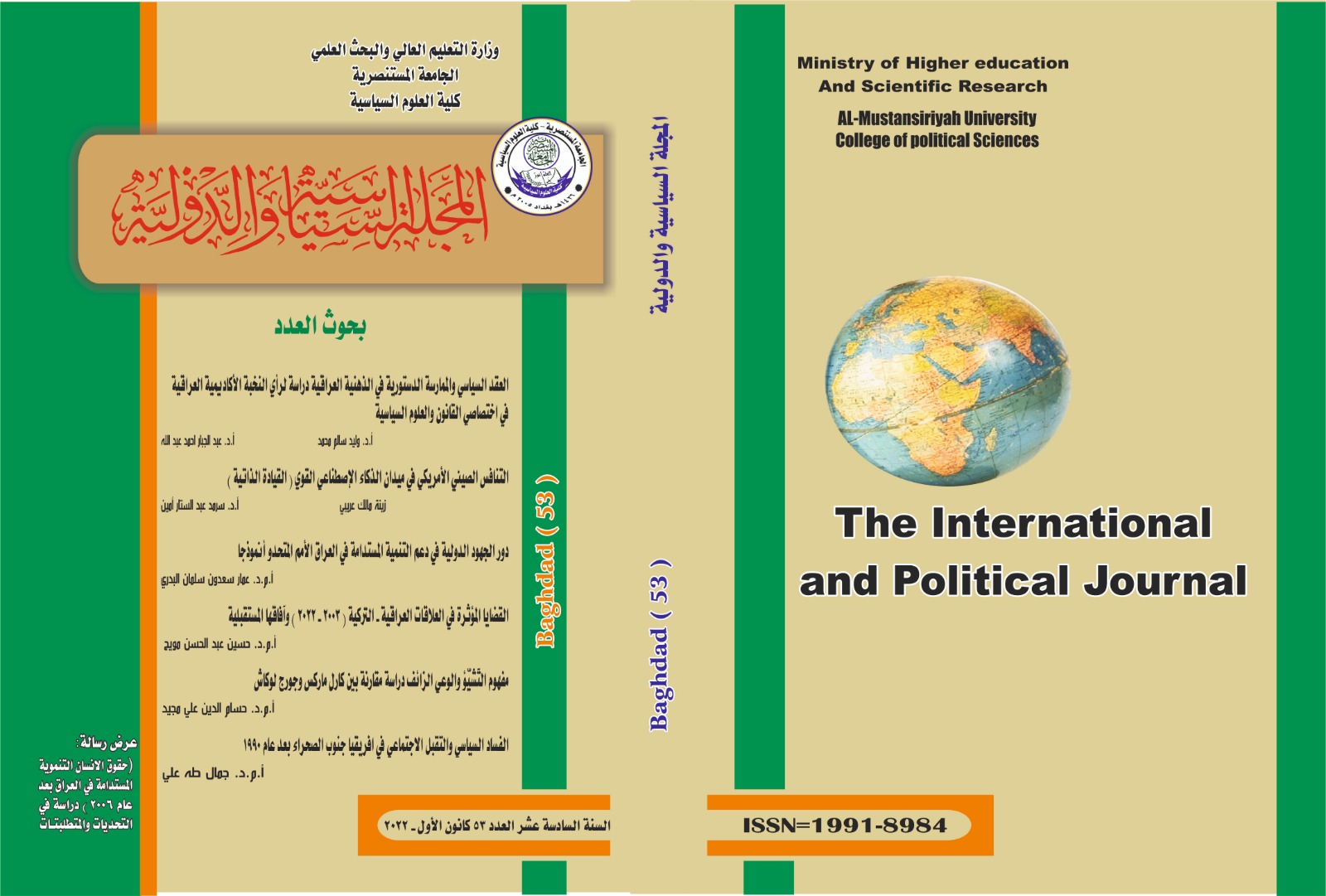Sectarianizing the Politics in the Middle East
DOI:
https://doi.org/10.31272/ipj.i55.188Keywords:
Securitization, Sectarianization, Security Complex, Proxy WarAbstract
day, many political regimes in the Middle East have been sectarianizing their internal and external policies, (i.e., given doctrinal features to these policies). This is what led to the emergence of new alignments and alliances that changed the political map of the region. With the help of the securitization theory, which was developed by the Copenhagen School of Security Studies, this research attempts to explain the phenomenon of sectarianism and its repercussions on the security and stability of the Middle East. The research also deals with the emergence of a security complex or dilemma on sectarian bases, such as the Iranian-Turkish-Saudi complex, and its role in creating hotbeds of tension and conflicts in the region.The research studies the phenomenon of securitization at the local and regional levels, and assumes that this phenomenon, despite its historical roots, is made by the regimes themselves, and is only intended to pass political projects that serve the regimes but not their peoples. The research concludes that there is no solution to sectarian dilemmas except with mutual understanding among the regimes that make them, and the resort to the policy of friendship and cooperation instead of the policy of conflict and rivalry.
References
Ali, Ahmad. 1994. Al-Qurán: A Contemporary Translation. New Jersey: Princeton University Press.
al-Rasheed, Madawi. 2002. A History of Saudi Arabia. UK: Cambridge University Press.
Armstrong, Karen. 2000. Islam: A Short History. London: Phoenix Press.
—. 2000. Islam: A Short History. UK: Weidenfield & Nicolson.
Azizi, Hamidreza. 2022. Turkish and Iranian Involvement in Iraq and Syria. Berlin: German Institute for International and Security Affairs.
Battaloglu, Nesibe. 2021. "Ideational Factors in Turkey's Alignment with Qatar and their Impact on Regional Security." The International Spector (Routledge) 56 (4): 101-118. DOI: https://doi.org/10.1080/03932729.2021.1994181
Bayram, Aydin. 2014. "The Rise of Wahhabi Sectarianism and its Impact in Saudi Arabia." Journal of Ataturk University - Faculty of Theology 246-260.
Bealey, Frank. 1999. Dictionary of Political Science. Oxford: Blackwell Publishers . DOI: https://doi.org/10.1515/9781474400534
Bell, Catherine. 1997. Ritual: Perspective and Dimentions. New York: Oxford University Press.
Benjamin, Medea. 2018. Inside Iran: The real History and Politics of the Islamic Republic of Iran. NY: OR Books. DOI: https://doi.org/10.2307/j.ctv62hfzm
Berg, Bruce L. 2017. Qualitative Research Methods for the Social Science. MA: Pearson Education Limited.
Boone, Mackenzie Tyler and Anthony M. 2012. Rivalry in the Middle East: Saudi Arabia and Iran. New York: Nova Science Publishers.
Bowen, Wayne H. 2008. The History of Saudi Arabia. NY: Greenwood Press.
Buzan, Barry. 1983. People, States, and Fear, . Brighton: Wheatsheaf.
Buzan, Barry, and Ole Weaver. 2003. Power and Regions: The Structure of International Security. Cambridge: Cambridge University Press.
Buzan, Barry, Ole Waever, and Jaap de Wilde. 1998. Security: A New Framework of Analysis. London: Lynne Reinner Publishers. DOI: https://doi.org/10.1515/9781685853808
Campo, Juan E. 2009. Encyclopedia of Islam . New York: Facts On File.
Cevik, Hamidreza Azizi and Salim. 2022. Turkish and Iranian Involvement in Iraq and Syria. Berlin: German Institute for International and Security Affairs. Accessed October 2022. https://www.swp-berlin.org/publications/products/comments/2022C58_Turkish-Iranian_Involvement.pdf.
Commins, David. 2006. The Wahhabi Mission and Saudi Arabia. New York: palgrave Macmillan. DOI: https://doi.org/10.5040/9780755609444
Das, Hirak Jyoti. 2019. The Role of Qatar and UAE in the Libyan Civil War. New Dalhi: Vive Kananda International Foundation.
Eligur, Banu. 2010. The Mobilization of Political Islam in Turkey. cambridge: Cambridge University Press.
Findley, Carter. 2010. Turkey, Islam, Nationalism, and Modernity: A History 1789-2007. Yala: Yala University Press.
Finkel, Caroline. 2007. Osman's Dream: The Story of the Ottoman Empire (1300-1923). New York: Basic Books.
Gens, Kaya. 2019. "Erdogan's Way: The Rise and Rule of Turkey's Islamist Shapeshifter." Foreign Affairs.
Hallaq, Wael. 2009. An Introduction to Islamic Law. Cambridge : Cambridge University Press.
Halliday, Fred. 1996. Islam and the Myth of Confrontation. New York: I. B. Tauris Publishers. DOI: https://doi.org/10.5040/9780755611973
Heather M. Robinson, Ben Connable, David E. Thaler, Ali G. Scotten. 2018. Sectarianism in the Middle East: Implications for the United States. California: Rand. DOI: https://doi.org/10.7249/RR1681
Heller, Christian H. 2018. "Great Power Compitition in the Age of Islam: Contemporary Lessons from the Ottoman-Safavid Rivalry." Marine Corps University Journal 9 (2): 22-43. https://www.usmcu.edu/MCUPress/. DOI: https://doi.org/10.21140/mcuj.2018090202
Imber, Colin. 2002. The Ottoman Empire, 1300-1650: The Structure of Power. New York: Palgrave Macmillan .
Kane, Sean. 2011. Washington: United States Institute of Peace. Accessed June 2011. https://www.usip.org/sites/default/files/Turkish_Iranian_Competition.pdf.
Kane, Sean. 2011. Turkish Iranian Competition in Iraq. Washington: United States Institute of Peace.
Kashmiri, Sayyed M. B. 2018. Shia' Muslims: Our Identity, Our Vision, and the Way Forward. 2nd. USA: Imam Mahdi Associasion of Marjaeya.
Keddie, Nikke R. 2006. Modern Iran: Roots and Results of Revolution. London: Yala University Press.
Keddie, Nikki R. 2003. Modern Iran Roots and Results of Revolution. Yala: Yala University Press.
Loft, Philip. August 2022. Iran's Influence in the Middle East. London: House of Commons Library.
MacQueen, Ben. 2020. An Introduction to Middle East Politics. 2 nd. . London: Sage Publishing.
Marschall, Christian. 2003. Iran's Persian Gulf Policy: From Khomeini to Khatami. New York: Routledge. DOI: https://doi.org/10.4324/9780203417928
Marshall, Christian. 2003. Iran's Persian Gulf Policy: From Khomeini to Khatami. London: RoutledgeCurzon.
Nanji, Azim. 2008. Dictionary of Islam. London: Penguin Group.
Nasr, Vali. 2006. The Shia' Revival: How Conflicts within Islam will Shape the Future. New York: W. W. Norton & Company.
P. M. Holt, Ann K. S. Lambton and Bernard Lewis. 2008. The Cambridge History of Islam V. 1 A. Cambridge: Cambridge University Press.
Rabasa, Angel & F. Stephen Larrabee. 2008. The Rise of Political Islam in Turkey. New York: RAND Corporation.
Robinson, Connable, Thaler, Scotten. 2018. Sectarianism in the Middle East. California: Rand. DOI: https://doi.org/10.7249/RR1681
Taniyici, Saban. 2003. "Transformation of Political Islam in Turkey." Party Politics (Saga Publications) 9 (4): 463-483. DOI: https://doi.org/10.1177/135406880394003
Vassiliev, Alexi. 2000. The History of Saudi Arabia. London: Saqi Books.
Venetis, Evangelos. 2014. The Struggle between Turkey and Saudi Arabia for the Leadership of Sunni Islam. Athens, Greece: Hellenic Foundation for European and Foreign Policy.
Wehrey, Frederic. 2017. Beyond Sunni and Shia: The Roots of Sectarianism in a Changing Middle East. Oxford: Oxford University Press. DOI: https://doi.org/10.1093/oso/9780190876050.001.0001
Winsor, Curtin. 2007. "Saudi Arabia, Wahhabism, and the Spread of Sunni Theofascism." Mideast Monitor 2 (1).
Wynbrandt, James. 2010. A Brief History of Saudi Arabia. 2nd. . PA: Facts on Files.
Additional Files
Published
How to Cite
Issue
Section
License

This work is licensed under a Creative Commons Attribution 4.0 International License.
Journal Policies
All articles published in the International and Political Journal are licensed under a Creative Commons Attribution 4.0 International License. This means that the Authors can:
The journal allows reuse and remixing of content in accordance with a Creative Commons license.
Copy and redistribute the material in any medium or format.
Policy of publishing in The International and Political Journal
The journal is committed to the ethics of scientific publishing, and according to the publication ethics report of the journal.
The decision to publish is based on the value of the scientific research, to what extent it meets the conditions of publication approved, the declared policy of the journal, and its specialty.
It is based on the principles of the scientific honesty, and originality of research submitted for publication. It deals with the names of reviewers and their reports with great confidentiality.
The opinions published in the journal reflect the views of the authors, and not necessarily reflect the opinion of the editorial board.
The journal does not adhere to the publication of whatever comes to it. The time and place of publication are subject to technical considerations adopted in the editorial plan of the journal.
The journal does not abide to return the research papers to their owners whether accepted for publication or not.
The researcher is to be provided with the acceptance of publication within about 24 WEEKS. As for publication, the editorial board reserves its right in priority of publishing. The arrangement of the research papers in the same issue is subject to technical standards.
Diversify of publishing papers from solid universities and scientific centers from inside and outside Iraq is preferable.
The journal maintains hard copies and electronic archive of the published issues in addition to the publication of the research papers.
The journal also publishes the issues electronically through the website of the journal, and the official website of the Iraqi academic journals, and makes it possible to download. Thus, documenting the intellectual property of the research papers and publishing them internationally is achieved.
Terms of publication may be modified when necessary with no previous notice.
The researcher obtains a copy of his research paper. If he wishes to buy acopy of the journal, the volume costs ID 10000 from inside Iraq and $8from the outside.
The Editorial Board considers that the researcher who submits his research paper for publication in the journal has already read the terms and conditions of publication and agreed on them.
The journal publishes the research papers of the postgraduate students in special issues for this purpose.
Stages of editing and publishing:
The researcher undertakes that his research has never been published before, and has not been submitted for publication to other sides until the end of the evaluation procedures and the acceptance of publication in the journal.
The research papers submitted for publication are to subjected for preliminary examination by the editorial board to determine their suitability for the journal specialization, its policy and the safety of scientific research procedures, and then to indicate its eligibility for scientific evaluation. The editorial board may apologize for accepting the research all together or require the researcher to amend it in accordance with the journal policy before sending it to editors.
After conducting the scientific evaluation, the research paper returns back to the researcher to make the required amendments within a maximum of two weeks.
A copy of the final research paper is to be submitted to the secretariat of the journal a hard copy and a soft copy on a CD, in both Word and PDF format. The researcher is fully responsible for the typing and linguistic mistakes after submitting the full research paper on a CD.
Plagiarism checker
All research papers are subjected to Turnitin program to uncover plagiarism before being sent to scientific evaluation. The researcher undertakes a written pledge to take the legal and moral responsibility, in the event of the emergence of plagiarism or taking from the efforts of other researchers, without a reference to them. The journal uses appropriate anti-plagiarism software, such as Turnitin to check for plagiarism.
Dealing with Allegations of Research Misconduct
The Journal shall take reasonable and serious steps to identify and prevent the publication of papers where research misconduct has occurred, including plagiarism, citation manipulation, and data falsification/fabrication.
Scientific Evaluation:
Scientific evaluation strengthens the research paper submitted to the journal and helps to take the appropriate decision by the editorial board to publish it. It also benefits the researchers to improve and correct their research papers.
The research paper is sent to three evaluators in the same specialty to evaluate












